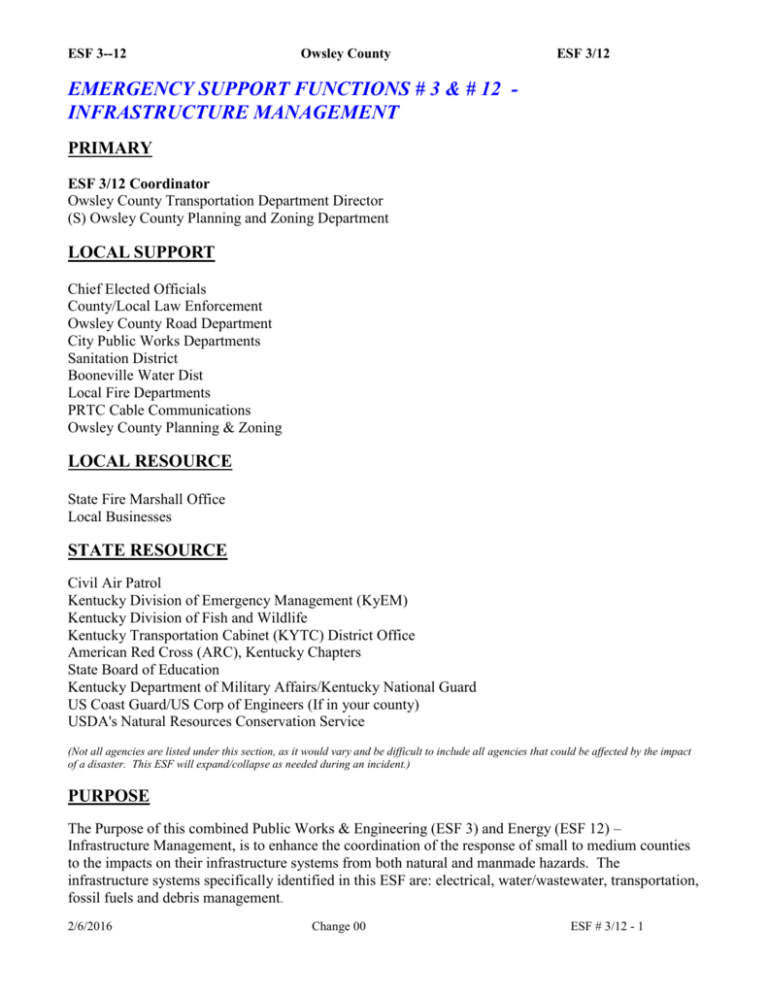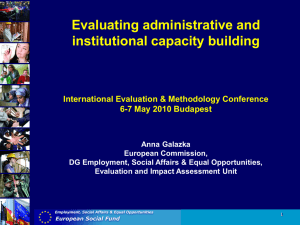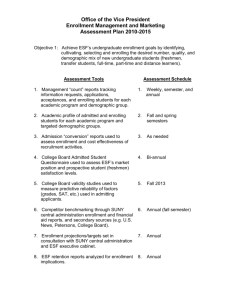ESF 3-12 Pub works energy
advertisement

ESF 3--12 Owsley County ESF 3/12 EMERGENCY SUPPORT FUNCTIONS # 3 & # 12 INFRASTRUCTURE MANAGEMENT PRIMARY ESF 3/12 Coordinator Owsley County Transportation Department Director (S) Owsley County Planning and Zoning Department LOCAL SUPPORT Chief Elected Officials County/Local Law Enforcement Owsley County Road Department City Public Works Departments Sanitation District Booneville Water Dist Local Fire Departments PRTC Cable Communications Owsley County Planning & Zoning LOCAL RESOURCE State Fire Marshall Office Local Businesses STATE RESOURCE Civil Air Patrol Kentucky Division of Emergency Management (KyEM) Kentucky Division of Fish and Wildlife Kentucky Transportation Cabinet (KYTC) District Office American Red Cross (ARC), Kentucky Chapters State Board of Education Kentucky Department of Military Affairs/Kentucky National Guard US Coast Guard/US Corp of Engineers (If in your county) USDA's Natural Resources Conservation Service (Not all agencies are listed under this section, as it would vary and be difficult to include all agencies that could be affected by the impact of a disaster. This ESF will expand/collapse as needed during an incident.) PURPOSE The Purpose of this combined Public Works & Engineering (ESF 3) and Energy (ESF 12) – Infrastructure Management, is to enhance the coordination of the response of small to medium counties to the impacts on their infrastructure systems from both natural and manmade hazards. The infrastructure systems specifically identified in this ESF are: electrical, water/wastewater, transportation, fossil fuels and debris management. 2/6/2016 Change 00 ESF # 3/12 - 1 ESF 3-12 Owsley County ESF 3/12 SITUATIONS AND ASSUMPTIONS During a disaster or emergency, county and local governments have a limited capability and an immediate requirement to provide emergency services for restitution of utilities: electrical, water/wastewater, transportation and fossil fuels. Debris management, which may become quickly overwhelming following a catastrophic incident will include emergency clearance of debris; cleaning, repairing, or construction of damaged emergency access routes; emergency restoration of critical public services and facilities; emergency demolition of damaged structures and facilities; and technical assistance and damage assessment of private utility operations. Damage can include economic loss, injury to persons or animals in addition to the physical damage to property and buildings. Repair and construction of roads and bridges, installation and repair of traffic and/or snow and ice removal will have to be coordinated. control devices, As the result of a catastrophic incident the following conditions could exist within the County: Electric: A catastrophic incident such as severe weather conditions (ice storms, heat waves, or tornadoes) may cause energy shortages by disrupting electrical transportation services, interfering with delivery through transmission lines, or by forcing higher than normal usage of energy for heating or cooling. Evacuation/relocation of the county and/or State population due to a catastrophic incident will cause a disruption of energy distribution. Public and private utilities systems usage may be curtailed or otherwise cease to operate due to damage or other emergency conditions. Depending on the situation, rationing or conservation of electricity may be imposed to conserve Kentucky’s energy resources. Public and private utility and energy organizations will perform tasks on their own authority to restore their essential services to the jurisdiction. Water/ Wastewater: 2/6/2016 Clean water is necessary to sustain human life, agricultural and industrial production. Potable water may not be available due to drought, hazardous materials spills, severe weather or mechanical failure. Change 00 ESF # 3/12 - 2 ESF 3-12 Owsley County ESF 3/12 A catastrophic incident could seriously cripple the County making potable water extremely scarce. Rationing to conserve the County’s water would have to be undertaken. Public and private water usage may be curtailed or otherwise cease to operate due to damage or other emergency conditions. Receipt and distribution of bottled water may be required. Public and private wastewater and sewer systems usage may be curtailed or otherwise cease to operate due to damage or other emergency conditions. The return of untreated consumed water to the ground water supply can so contaminate this supply as to make converting back to potable water uneconomical. Transportation: A catastrophic incident could block or alter normal channels of transportation in the County. Before, during and after an incident, there may be a need for transportation to move and protect life and property. Streets and major transportation routes may be obstructed with large amounts of debris and may be impassable for long periods of time. Access may be restricted to damaged areas and only accessible by air. Primary routes of transportation throughout the County will be given priority for damage assessment, debris removal, and road repairs. Fossil Fuel: Disruption of fuel distribution, unexpected high usage rates, or a slowdown of fuel production may cause local fuel shortages. Other energy shortages, such as interruptions in the supply of natural gas or other petroleum fuels for automotive transportation and other industrial uses may result from extreme weather conditions, strikes, or international embargoes. Rationing to conserve the County’s fuel resources may be implemented pursuant to KRS 39A.100. Debris Management: 2/6/2016 Change 00 ESF # 3/12 - 3 ESF 3-12 Owsley County ESF 3/12 Incidents of all types often result in debris that must be removed to save lives and minimize damage. Following a catastrophic incident, most roads and streets may be impassable due to debris. Severe damage may be caused to homes, businesses, public buildings, bridges, and other infrastructure, resulting in large debris fields that may be hazardous to the health and welfare of citizens in the County. The KYTC may be requested to remove debris from the State highway and road system. Private construction and industrial heavy equipment may be used for debris removal, when necessary. Storage and/or disposal of contaminated materials and/or contaminated soil will be a local task, with State and Federal support. MISSION The Coordination of the overall response of County resources to a major failure of infrastructure due to natural or manmade incidents. DIRECTION AND CONTROL The ESF 3/12 Coordinator will recommend to ESF 7 Coordinator, the County resources to be committed to the incident and alert appropriate personnel. Electric: The ESF 3/12 Coordinator is the Owsley County Planning Department designated representative to coordinate all county energy emergencies. During an energy emergency, the State, upon direction from the Governor’s Office, may form an Energy Resource Management Board. The ESF 3/12 Coordinator will work with the State Energy Resource Management Board to develop local energy usage guidelines. The ESF 3/12 Coordinator will coordinate, in cooperation with County EOC operations and other response forces, countywide response and recovery efforts of infrastructure and energy during emergencies and following a major incident. Energy will be distributed in the following priorities: o 2/6/2016 Critical facilities are defined by FEMA Publication 543, Design Guide for Improving Critical Facility Safety from Flooding and High Winds: Providing Protection to People and Buildings: Change 00 ESF # 3/12 - 4 ESF 3-12 Owsley County ESF 3/12 o Critical facilities commonly include all public and private facilities that a community considers essential for the delivery of vital services and for the protection of the community. They usually include emergency response facilities (fire stations, police stations, rescue squads, and emergency operation centers [EOCs]), custodial facilities (jails and other detention centers, long-term care facilities, hospitals, and other health care facilities), schools, emergency shelters, utilities (water supply, wastewater treatment facilities, and power), communications facilities, and any other assets determined by the community to be of critical importance for the protection of the health and safety of the population. The adverse effects of damaged critical facilities can extend far beyond direct physical damage. Disruption of health care, fire, and police services can impair search and rescue, emergency medical care, and even access to damaged areas. o Essential industry, commercial and agriculture o Non-essential industry and agriculture; and o Non-essential commercial and residential Water/Wastewater: 2/6/2016 The Chief Elected Official(s) may, under provisions of KRS 39A-G declare an emergency and regulate the use of potable and raw water. The Environmental and Public Protection Cabinet (E&PPC), and the Cabinet for Health and Family Services (CHFS) have the responsibilities of insuring potable water is available for the citizens of the Commonwealth. E&PPC is responsible for overseeing the withdrawing and discharging of all water used in private and public water systems. CHFS is responsible for overseeing the withdrawing and discharging of water confined to an individual on private property. In the event of multi-county water quality problems, an Emergency Water Management Board may be formed to coordinate the Commonwealth’s water policy. The State Emergency Water Management Board, by the power vested in the Secretary of the Environmental and Public Protection Cabinet by KRS 151.110 and KRS 151.200, can monitor and allocate water resources at the local level. The ESF 3/12 Coordinator will work with the State Board to develop water resource guidelines. Change 00 ESF # 3/12 - 5 ESF 3-12 Owsley County ESF 3/12 Transportation: The ESF 3/12 Coordinator will coordinate with the ESF 1 Coordinator to provide emergency transportation in an incident. Fossil Fuels: The ESF 3/12 Coordinator will coordinate with the oil and gas industry, and other response forces, for distribution and use of fossil fuels during emergencies and following a major incident. Debris Management: The ESF 3/12 Coordinator will work with and coordinate with other county agencies to begin immediate damage assessment and debris removal from infrastructure in order to protect public health and safety. CONCEPT OF OPERATIONS Phases of Management Preparedness The ESF 3/12 Coordinator will prepare and maintain a current list of infrastructure necessary for maintaining basic electrical, water/wastewater and fossil fuel delivery to the County. The ESF 3/12 Coordinator will prepare and maintain ESF administrative and financial procedures as required to properly document activities during an incident. Response The ESF 3/12 Coordinator will work with Emergency Management to provide public service announcements on energy conservation, mitigation impacts and restoration forecasts. The ESF 3/12 Coordinator will: Electric: 2/6/2016 Determine critical supply needs of priority populations (e.g. infants, elderly, and other people with special needs.) Identify and prioritize vital public facilities without power (i.e., hospitals, nursing homes) and coordinate delivery of emergency generators. Obtain information and assess electrical power damage and outages. Coordinate temporary, alternate and/or interim sources of electrical power supplies. Change 00 ESF # 3/12 - 6 ESF 3-12 Owsley County ESF 3/12 Water/Wastewater: Determine critical supply needs of priority populations (e.g. infants, elderly, and other people with special needs.) Coordinate the repair and restoration of critical facilities for water distribution, wastewater, and solid waste facilities. Coordinate with ESF 8 (Public Health) for use of Points of Distribution/Disbursing throughout the affected area for distributing emergency water supplies. Transportation: Identify and assess primary transportation routes in the county. Prioritize primary routes that need immediate repair/restoration and debris removal. Identify transportation resources available for repairing and restoring primary routes and for evacuation of citizens, if needed. Coordinate available traffic control equipment and personnel. Fossil Fuels: Determine critical supply needs of priority populations (e.g. infants, elderly, and other people with special needs.) Obtain information and assess oil and petroleum fuel supply damages. Identify and assess requirements to repair pipeline and fuel supply systems. Coordinate temporary, alternate and/or interim sources of oil and petroleum supplies. Recovery Assist in damage assessment operations and relay damage assessment information to the County EOC. Electric: Identify and assess requirements to repair electrical systems. Assess requirements for power restoration. Water/Wastewater: 2/6/2016 Change 00 ESF # 3/12 - 7 ESF 3-12 Owsley County ESF 3/12 Augment sanitation services by providing portable toilets or other available sanitation services to both the public and work areas, if available. Transportation: Coordinate the efforts to reestablish and/or maintain transportation infrastructures that have been damaged and coordinate their repair. Fossil Fuels: Assess requirements for pipeline and fuel supply restoration. Review and assess potential need for price controls. Debris Management: Coordinate the stabilization of public and private structures to facilitate search and rescue and/or protect the public’s health and safety. Identify and label uninhabitable/unsafe structures. Coordinate debris removal and disposal with priority given to the following: o Primary roads serving Hospitals & Nursing Homes o Helipad locations o County EOC Emergency Service Locations (i.e. Fire, EMS, Rescue, etc.) Primary streets and roads Critical Utilities (power lines, substations, water and waste-water plants, and communications sites) Reception Centers and Shelters Staging areas and refueling areas School bus routes Coordinate temporary debris storage, sorting and chipping sites throughout the affected area(s) to facilitate debris management. Develop and maintain standing contracts that allow for an equipment surge to meet the demands of debris removal and disposal. Activate contracts that allow for an equipment surge to meet the demands of debris removal and disposal needs during an incident. ORGANIZATION AND ASSIGNMENT OF RESPONSIBILITIES The ESF 3/12 Coordinator will identify and coordinate local, state and federal agencies to restore access into the disaster area(s), provide damage assessment information and direct the rehabilitation of critical infrastructure for the County. GENERAL ORGANIZATION RESPONSIBILITIES Operational control remains the same during emergency situations as during normal activities; however, operations may require 24-hour coverage, and a central point of overall coordination. The ESF 3/12 2/6/2016 Change 00 ESF # 3/12 - 8 ESF 3-12 Owsley County ESF 3/12 Coordinator must be prepared to assist in lengthy operations that start in response and continue through recovery and involve clean up activities and return of resources. During an emergency or following a major incident, the County and local governments will take a greater role in providing and coordinating resources, equipment and personnel used to maintain or restore the County’s infrastructure and energy sources. As their capabilities allow, the various agencies in the County with public works capabilities will assist each other during an incident. The County EOC will receive requests for emergency debris removal, prioritize those tasks, and deploy available public and private resources. SPECIFIC KEY POSITION RESPONSIBILITIES Primary - County Infrastructure Coordinator Upon activation, report to the County EOC. Coordinate with the State ESF # 3 and ESF #12 Primary Agencies. Coordinate directly with on-scene Federal ESF #3 and ESF #12 representatives, when required. Work with the County EOC to develop strategies and priorities of response and recovery efforts to damaged areas and/or disruption of infrastructure and energy services. Coordinate countywide efforts, including outside assistance, to maintain and/or restore infrastructure usage and energy. In reference to infrastructure and energy issues, receive and assess requests for emergency aid and/or offers of emergency services from private and public agencies and make recommendations to the County EOC. Keep the County EOC informed on other current and pending emergency issues involving County infrastructure and energy sources. Develop and maintain relations with other representatives from the County, surrounding counties, municipalities, local military facilities, and private agencies supporting and servicing infrastructure and energy within the County (to include local electric, fossil fuel, telephone, water/wastewater, industry contacts, and other utilities). In coordination with support agencies and the County EOC, prioritize restoration efforts of County infrastructure. Maintain accurate logs and other records to include tracking resources, and expenses. Coordinate the development of a county debris management plan. Coordinate with representative from other County(ies), surrounding municipalities, local military facility, and private agencies supporting and service infrastructure and energy within the County (to include local electric, fossil fuel, telephone, water/wastewater, other utilities, and industry contacts) to: o o 2/6/2016 Develop and maintain a list of source, location, and availability of equipment, fuel, and operational personnel to support response/ recovery operations. Provide for County EOC backup electrical power. Change 00 ESF # 3/12 - 9 ESF 3-12 Owsley County o o o o o o o o o o o ESF 3/12 Maintain emergency power, water and sanitation resources at vital facilities in the County during emergencies. Store and provide fuel for emergency vehicles. Prepare standard operating guidelines/ procedures to provide for infrastructure and energy functions during emergencies (e.g., roads, streets, and sewer, water, utility, and energy services). Establish communications with support agencies. Coordinate and prioritize debris management operations. Prearrange with sources of potable water to provide for emergency potable water requirements. Prearrange for emergency sanitation. Coordinate with industry trade groups and associations to obtain needed fuel for industrial and other emergency purposes in the event of an impending or actual shortage. Monitor countywide infrastructure and energy maintenance and restoration efforts and periodically report your findings to the County EOC, when the EOC is activated. Coordinate damage assessment operations and relay damage assessment information to the County EOC. If required, assign emergency response and assessment teams to impacted areas to determine possible affected areas and resources for infrastructure and energy restoration.. Support County Emergency Management Director o o Assist all organizations supporting this ESF in the County, and the surrounding municipalities, in obtaining required outside assistance and resources, as necessary. Develop mutual aid agreements as required. County/Local Law Enforcement Local Fire Departments Supporting Agencies will ensure their representatives to ESF 3 and ESF 12 are properly trained and exercised on the plans and procedures relating to their work. ADMINISTRATIVE SUPPORT REFERENCES 2/6/2016 Change 00 ESF # 3/12 - 10 ESF 3-12 Owsley County ESF 3/12 KRS 39A-G The National Response Framework The National Incident Management System Kentucky Division of Emergency Management, State Emergency Operations Center, Standard Operating Procedures 2/6/2016 Change 00 ESF # 3/12 - 11









